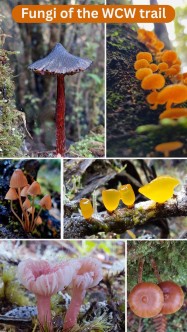Accessibility - and fungi - spark return to West Coast Wilderness Trail
Accessibility and fungi are the two reasons Wellington’s Ella and Ty Kahu have tackled the West Coast Wilderness Trail Great Ride more than once.
The couple’s latest trip differed from their first - after being diagnosed with motor neurone disease Ella swapped out her bike for a brightly coloured three-wheel Motom she calls Daisy.
Working as a senior lecturer and researcher into higher education at Massey University’s School of Psychology in Wellington, life changed when she noticed increasing weakness in her right hand.
After her diagnosis, early retirement followed and the couple decided to make the most of life.

Armed with the West Coast Wilderness Trail’s accessible ride guide, and having discovered incredible fungi last time, the Kahus decided to revisit the place they have fond memories of.
Fungi hunting has become a hobby of Ella’s. She came across the beautiful colours and shapes of fungi while on holiday in Australia and began a collection of photos.
“I just started noticing them and it’s been a bit of a hobby ever since.”
She remembers spotting some impressive fungi along the West Coast Wilderness Trail on the Canoe Cave walk at Lake Kaniere. She was keen to return to the bush to revisit those areas and discover more.
“I love the West Coast bush and the trail. You are so close to the bush. You are fully immersed in it which I absolutely love.
“I also enjoy it because we fungi hunt along the way. They are so beautiful. It’s a real treat.”
Unlike many cyclists, runners and walkers who venture along the trail at a faster pace with few stops, Ella’s slower pace and regular stops means she gets to take in her surroundings.
“Now that I am in Daisy and often travel slowly, I have been amazed by the mosses and the lichens too. It’s so beautiful and it feels good to be in the bush.”
The West Coast forest is known for its fungi. It has the right climate and the right kind of bush and leaf litter.
“The diversity is quite amazing and it is right there to see on the side of the trail,” says Ella.
While the trail’s fungi is something people often photograph and comment on, trail manager Jackie Gurden says it’s never been a focus or an attraction.
“It is something we need to learn more about and promote. Ella’s time on the trail has been valuable for us in that respect.”
For Ella, autumn riding is best.
“It’s the perfect time for fungi hunting. You look at the bush and it’s a patchwork of greens and hidden in tiny little spots are all these colours, shapes and forms.
“They can be there one day and gone two days later. It is like a hunt. It’s luck. You have to be there at the right time.”
Wellbeing is also behind Ella’s drive to ride.
“With my increasing disability I am aware my time doing this is very limited. There is research about the restorative and cognitive benefits of being in the bush and in nature.”
The Accessible Ride Guide written by the West Coast Wilderness Trail Trust has encouraged Ella. It is aimed at people in chairs, adaptive bikes and anyone with special mobility needs.
“Having access to all that information gives peace of mind. We know we can go out and get through the barriers and we know where I need help,” she says.
Upgrade work and investment has gone into the trail for accessibility reasons.
Some sections have been resurfaced and new accessible bridges and more safety barriers have been installed to make it more accessible and safer for riders on devices like Daisy.
Further work is under way to explore widening narrow sections and removing cattle stops.
“We have a trail that is relatively accessible and we want to get more people riding mobility devices to come and enjoy the ride. It’s why we wrote the guide,” says Jackie.
One of the West Coast’s trailblazers in accessibility was the late Merle Bradley of Hokitika. She also had motor neurone disease.
After completing the West Coast Wilderness Trail in 2016, her drive and passion was to promote wheelchair accessibility in forests.
Today, with help from the Accessible Ride Guide, Jackie encourages others like Ella and husband Ty to get out and enjoy the Great Ride.

